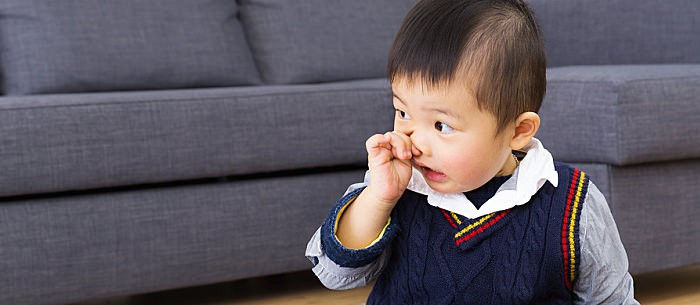At some point, all children embarrass their parents with inappropriate behaviours such as nose-picking — a lot of the time it’s just because they don’t know any better. It takes time for children to learn about boundaries and social expectations, so you need to be patient with them and guide them to the ‘appropriate’ way of doing things. Find out the reasons your children act undesirably and you’ll be much more equipped to address the inappropriate behaviours when they happen.
Types of Inappropriate Behaviour
There are many things children will do that they think are fine, but you know are inappropriate. These include nose-picking, lifting clothing, spitting, putting their fingers in their mouth, licking things, “adjusting” clothing, picking scabs, touching other people and asking very blunt questions about others.
There is generally a reason for the behaviour — and because children aren’t great at communicating yet, they may be trying to tell you something through actions instead of words. They could be nervous or anxious about something, or frustrated with a particular situation. It could be that your child is simply bored or likes the way something feels. Keep an eye on the actions to see if there are other consistent factors tied to it.
How to Deal With Bad Social Habits
When dealing with children who are still learning social norms, the best way to help alter their behaviour is through gentle reminders that do not call undue attention to the issue or embarrass the child. Some of the clear phrases you could use include, “Please let your shirt cover your body to keep it safe,” “We use a tissue to clean our nose. Let me get you one,” “Food needs to stay inside our mouths while we are eating,” “Hands may go in pockets, but not in our underwear,” and “Please stay in your chair right now.”
It’s important to deal with these issues quietly and without shaming the child or drawing further attention. Give the child a nonverbal reminder that they are doing something inappropriate. For instance, a visual signal like pulling on your ear.
When Does Inappropriate Behaviour Become a Concern?
Sometimes, children struggle with appropriate social behaviour for longer than expected. When a child is not learning social cues, not responding to redirection, or is unmanageable at home and at school despite consistent reinforcement, it may be time to talk to your paediatrician about your concerns. Document examples from home, school and other settings to help your child’s doctor direct you to the right kind of help.
Parents should try to determine if the child is continuing the undesirable behaviour because they can’t stop or because they don’t want to stop. If your child is under 6, they just might need more time to catch up to their peers socially. See a paediatrician if the child is 6 or older and still seems unable to suppress inappropriate behaviours in public. However, if the child seems to have control and refuses to stop the behaviour anyway, a counsellor can help, even if they are under 6. If you aren’t sure if the behaviour is intentional, talk to your paediatrician.
